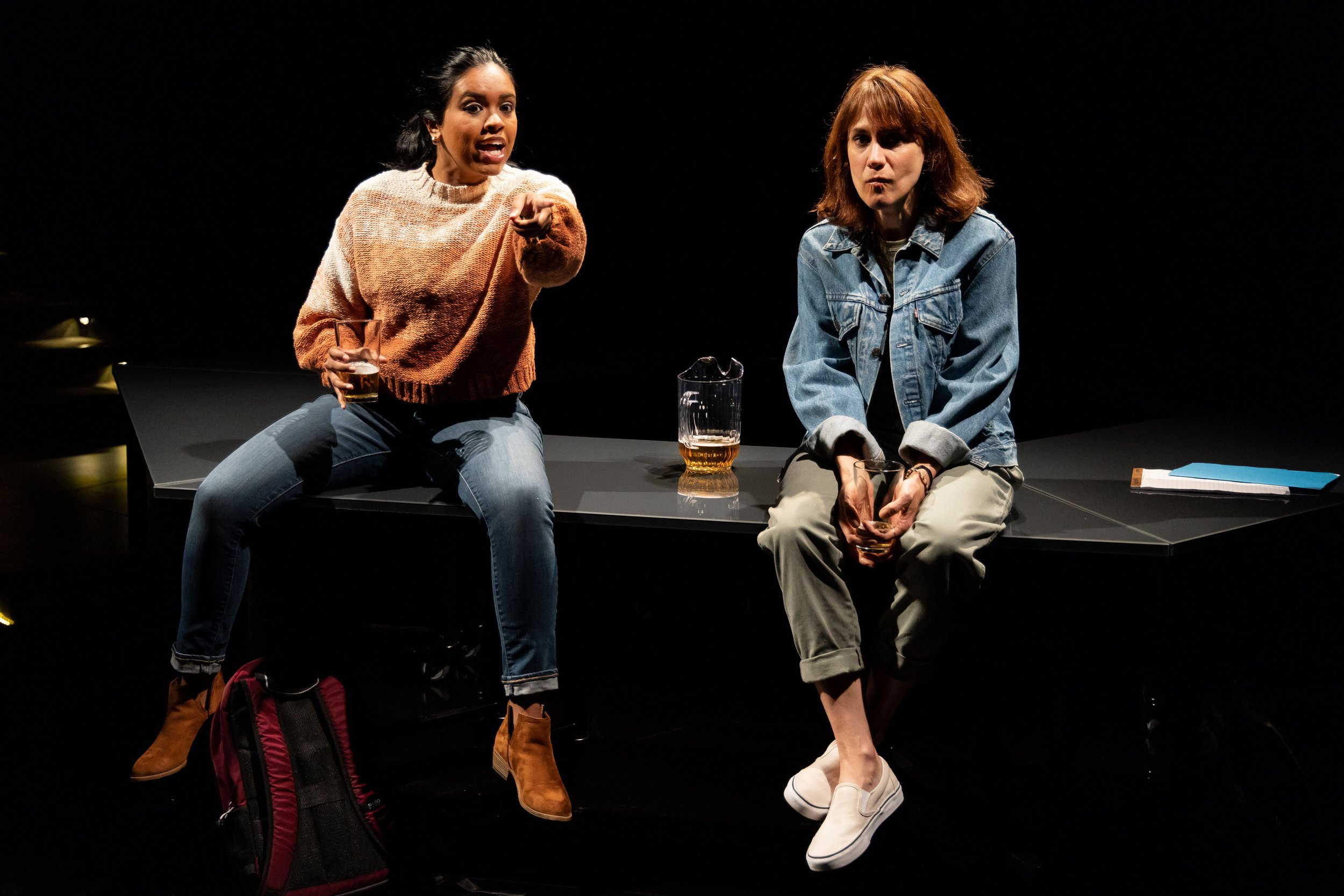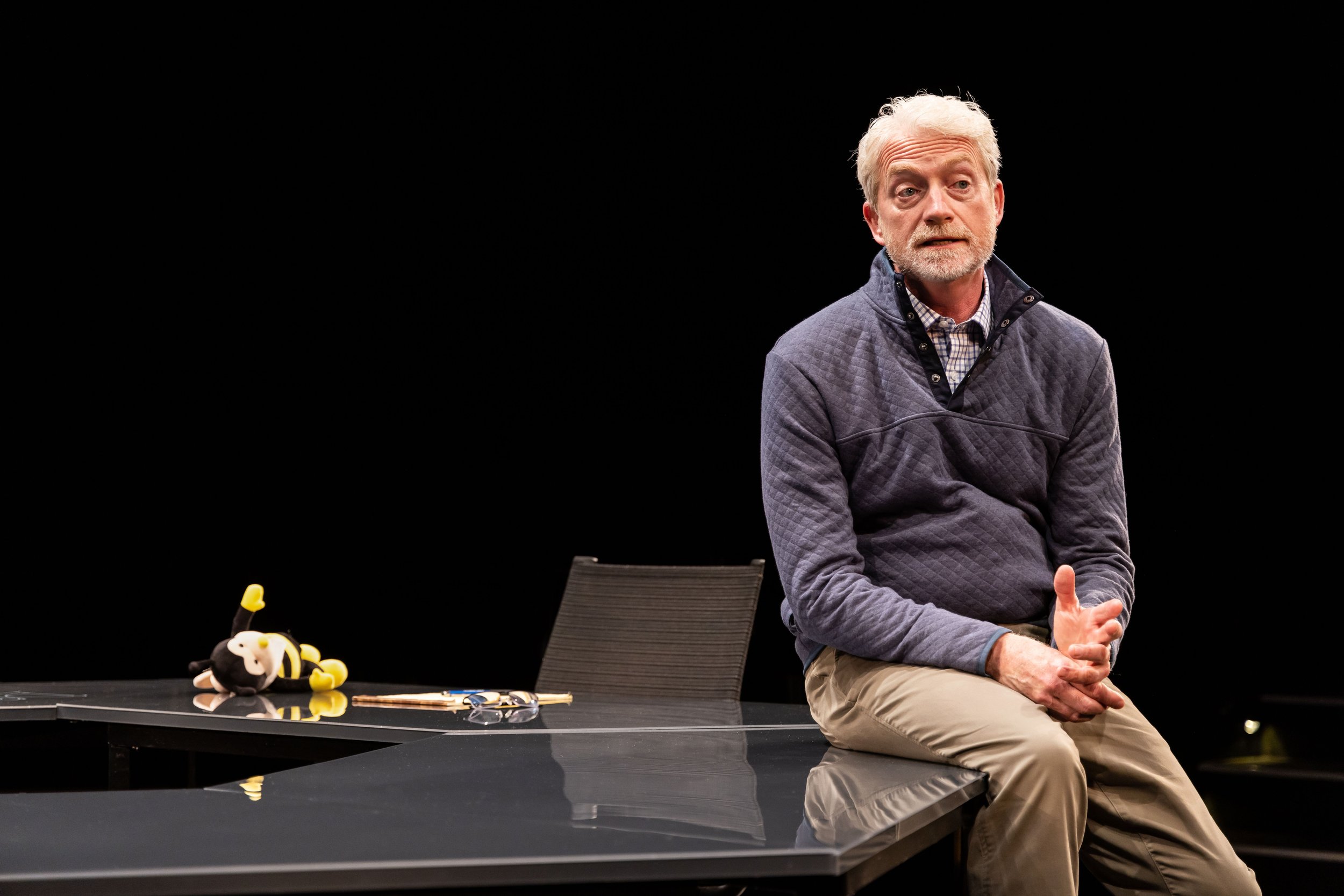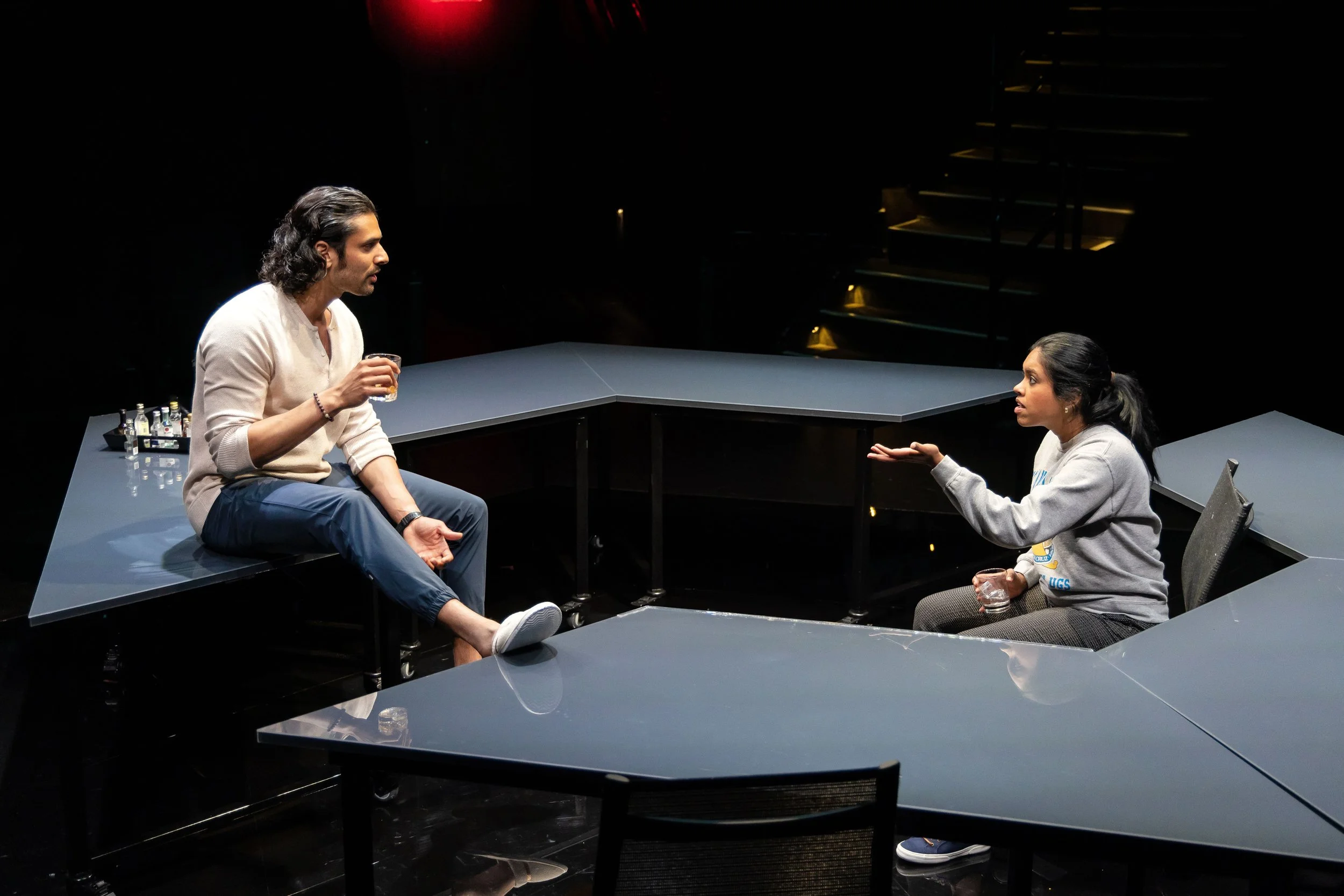REVIEW OF QUEEN, LONG WHARF THEATRE
One of the best things about Madhuri Shekar’s play Queen, now at Long Wharf Theatre, directed by Aneesha Kudtarkar, is that it humanizes scientific research—and shows that that’s where the problems start. The play dramatizes how emotions and the personal trajectories of careers, as well as the tensions of collaboration and subordination can deflect and distort.
Avanthika Srinivasan as Sanam, Stephanie Janssen as Ariel in Madhuri Shekar’s Queen, directed by Aneesha Kudtarkar, at Long Wharf Theatre (photo by Jeremy Daniel)
In Shekar’s play, two up-and-coming graduate researchers, Ariel Spiegel (Stephanie Janssen) and Sanam Shah (Avanthika Srinivasan), have been conducting experiments whose results seem definite. Their research, under Dr. Philip Hayes (Ben Livingston), is slated to appear in the prestigious journal, Nature, and as we meet the duo they are celebrating on a night out. However, there’s a slight hitch. Sanam reports that the most recent data has skewed their findings, suggesting that there has been an error somewhere, or at least that more trials are necessary to have definitive results.
All this might not matter too much—except that the research looks at what has caused bees to desert their hives, bringing about devastating effects in ecology and in the food chain. And the culprit behind the loss of bees and hives has been determined to be a pesticide manufactured by chemical—and engineered-food—giant Monsanto. In other words, the stakes are very high that the research prove, categorically, what it argues. Dr. Hayes’ immediate reaction is to say “fix it,” which means finding out where the problem lies, but which also assumes that their initial findings are correct.
Stephanie Janssen as Ariel, Ben Livingston as Dr. Hayes, Avanthika Srinivasan as Sanam in Queen at Long Wharf Theatre (photo by Jeremy Daniel)
Shekar surrounds this “workplace” problem with the details of the researchers’ lives. Ariel is a single mom who once worked in bee-keeping and who has a strong feeling for nature not simply as material for experiment. Her path into academic research has required some sacrifices and she doesn’t have the safety net that Sanam has. Sanam comes from a well-to-do family but the hitch there is that they expect her to find a husband, preferably one they choose for her. The notion that she might simply prefer to devote her life to research—she is a brilliant statistician—would cause a family crisis.
Keshav Moodliar as Arvind Patel, Avanthika Srinivasan as Sanam Shah in Queen at Long Wharf Theatre (photo by Jeremy Daniel)
And thus we meet Arvind Patel (Keshav Moodliar), a hedge-fund broker who is in the market for a wife. That makes this possible match sound very crass, and that element is there from the start, and yet Shekar’s script, and Moodliar’s affable charm, makes the two an engaging couple, even if at times at cross purposes. Without giving too much away, I saw Arvind’s last line to Sanam as putting their relationship in perspective, and we may be grateful that, even in the fraught ideologies of our day, two people can meet and interact without either having to take a superior moral ground.
Unfortunately that’s not the case outside romance. Back in the lab, emotions escalate quickly. As Ariel, Stephanie Janssen has a tough role: in one scene, with Sanam, she argues for the dark personal consequences of their publication not going forward as planned; in the next scene, with Dr. Hayes, she’s all about the high-minded reasons the research should be tabled. It’s a bit too bald a portrayal of the two sides of Ariel and makes her seem rather a loose cannon (though it seems we’re meant to see her as a kind of exemplar).
Ben Livingston as Dr. Philip Hayes in Madhuri Shekar’s Queen at Long Wharf Theatre, directed by Aneesha Kudtarkar (photo by Jeremy Daniel)
Likewise, Dr. Hayes has to go from supportive, mostly hands-off oversight to angry and threatening patriarch of a flawed system—or something. Anyway, it doesn’t play well, particularly as the script gives him, if not moral high ground, then at least the pragmatic sense of how these things go. Publication, even with flawed data that can later be disproven (or not), is better than not publishing and losing the momentum of their research. In other words, the world of academic publishing as seen from inside rather than in the hyper-speak of journalism.
Who emerges from this messy confrontation best is Sanam. Srinivasan’s performance is a bit tentative at times, but I felt that helped to add a human flaw to a character who is great at what she does. Her arguments with Ariel seem to give her the losing hand (both times, even when she switches to Ariel’s initial view!), but only if one is driven by emotion over pragmatism. The duo are given a nice conciliatory final scene ministering to bee hives which includes a bit too symbolically the sacrifice of a queen.
Avanthika Srinivasan as Sanam Shah, Stephanie Janssen as Ariel Spiegel in Queen at Long Wharf Theatre (photo by Jeremy Daniel)
And in the end it’s Sanam who sees that the new data might not be an error or an unhappy anomaly but could in fact be pointing to important new findings. So while Ariel praises the bees in her emotive way, it’s Sanam who actually sees what the bees are saying. As a scientist should.
Queen has been designed by scenic designer Junghyun Georgia Lee to be in the round. The seating surrounds hexagonal conference tables that are moved about in different configurations for the different scenes, but which maintain the aura of research and study. The play feels a bit set off within a bubble not aided by the fact that the theater is too large. The show is moving to Off-Broadway where, I imagine, it will gain a bit more intimacy in its staging, making the in-the-round format have more dramatic impact.
Keshav Moodliar as Arvind Patel, Avanthika Srinivasan as Sanam Shah in Queen at Long Wharf Theatre (photo by Jeremy Daniel)
Indeed, this is the last production slated to appear at Long Wharf Theatre’s storied theater at 222 Sargent Drive in New Haven, which has proven too large a space for LWT’s Off-Broadway-style offerings to fill. The new plan, as presented by Artistic Director Jacob Padrón, suggests that if you can’t get the audience to come to you, you have to go to the audience. LWT will begin its career as an itinerant theater in the Greater New Haven area sometime in 2023.
Queen
By Madhuri Shekar
Directed by Aneesha Kudtarkar
Scenic Design: Junghyun Georgia Lee; Lighting Design: Yuki Nakase Link; Costume Design: Phuong Nguyen; Sound Design and Original Music: Uptown Works (Daniela Hart, Noel Nichols, Bailey Trierweiler); Stage Manager: Courteney Leggett; Assistant Stage Manager: Tamar Friedman
Cast: Stephanie Janssen, Ben Livingston, Keshav Moodliar, Avanthika Srinivasan
Long Wharf Theatre
May 17-June 5, 2022





